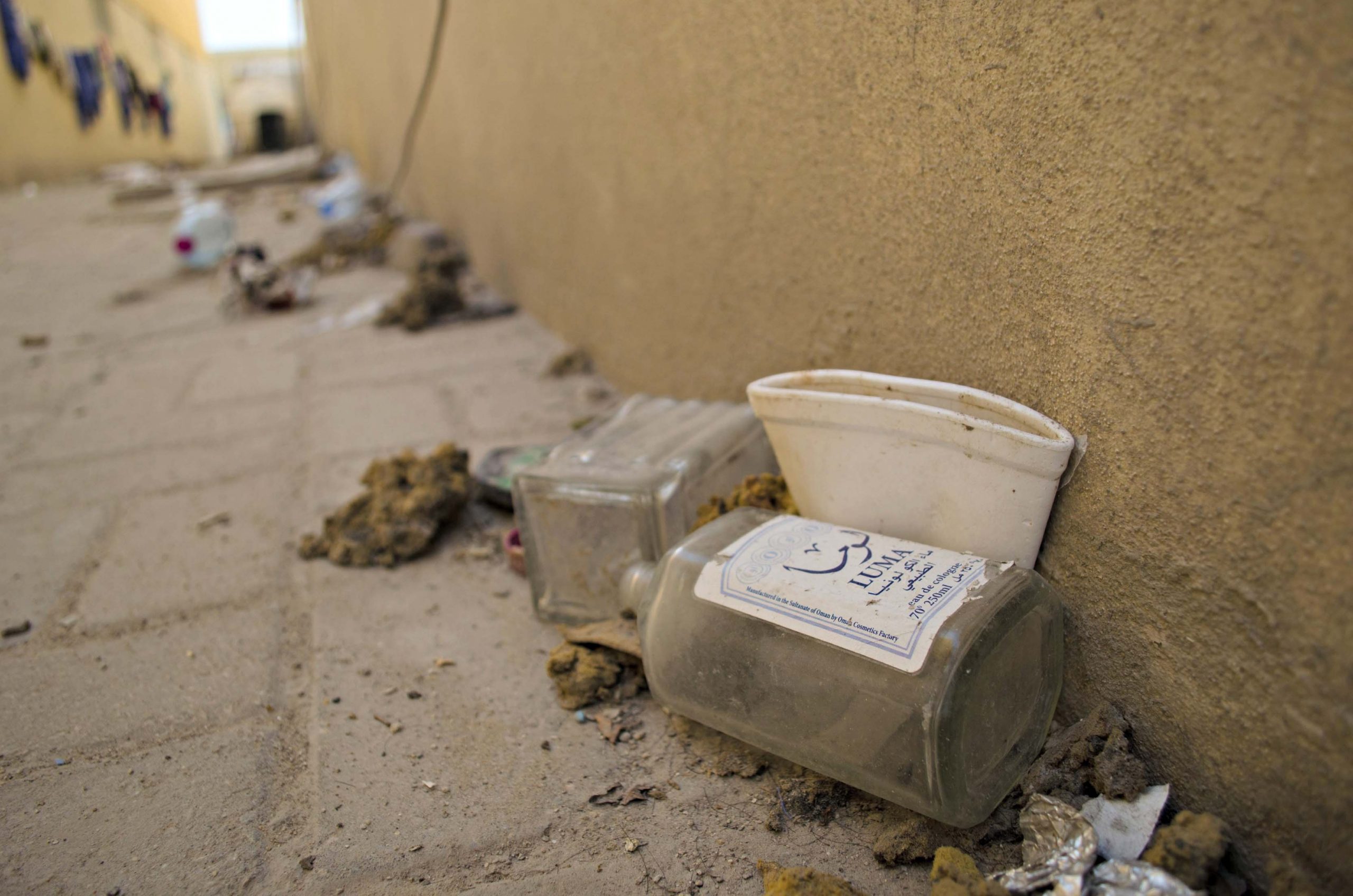
A former soldier in the Filipino army, Arnel Teodoro didn’t used to be short on energy. But nearly every morning at 3:30 am, the Qatar’s resident’s roommates wake up, eat, and shower while he remains unconscious.
Only just before the bus to work leaves at 4:30 can they shake him from sleep to dress and hurry out the door.
Teodoro, who asked that his name be changed for fear of reprisals from authorities and his employer, told Doha News that his inability to rise from sleep and lack of energy throughout the day result from drinking sadeeqi, a bootleg liquor infused with toxic industrial alcohols that is sold outside his housing complex.
Other health problems he attributes to the substance include short-term memory loss, sporadic stomach pain, bleeding during defecation, and impaired vision. Sadeeqi, which means “my friend” in Arabic, appears to have stabbed the 37-year-old in the back.
Popularity explained
Sadeeqi is popular among Qatar’s blue-collar population for many reasons, including its widespread availability, low price and avenue as an escape from reality.
Ajit Mohan (not his real name), an Indian expat and consumer of the substance, said alcohol sold on the black market in the Industrial Area ranges in price. The liquor obtained from the sole alcohol distributor in Qatar and resold to workers costs around QR124 ($34) per liter, while a liter of homemade sadeeqi goes for around QR15 ($4).
According to a researcher who has worked with Qatar’s Nepali expat community, restrictions on alcohol consumption play a big part in the popularity of sadeeqi.
In Qatar, only residents with permits can buy alcohol for home consumption, and one must earn a minimum of about QR4,000 ($1,100) per month and pay a deposit of $275 to apply for such a license. This excludes most migrant laborers, whose salaries fall short of the cut-off line.

“The black market is thriving in the Industrial Area because of the prohibition,” said Tristan Brusle of the French National Centre for Scientific Research.
In a 2012 study, Brusle found that two avenues of substance abuse had become widespread: consumption of Luma, a brand of cologne known to have high alcohol content, and amateur distillation and consumption of homemade libations.
Over the past few years, the Qatari government has taken steps to regulate imported colognes, especially those sold to low-wage laborers. But the sale and consumption of bootleg alcohol persist.
In Brusle’s view, the black market could be upended if alcohol was available to workers and regulated by authorities, which could prevent workers from turning to toxic alternatives.
Sleep, stress and recreation
Mohan, who said he had a previous alcohol problem back home in India, said sadeeqi has been a way of coping with stress. He said concerns about his family, girlfriend and work responsibilities weigh on him so much that he often lies in bed unable to sleep.
When he drinks sadeeqi, he immediately feels drowsy—the sensation described by users is a light-hearted buzz like that from alcohol, but with an extreme tendency for sleepiness—and is able to doze off without a problem.
According to Crista Crittenden, a psychology professor at CMU-Q, anxiety and stress are common among migrant workers in Doha, who left their families to work long hours in a different culture. This anxiety leads to a desire for escapism.
Another reason commonly cited for drinking sadeeqi is simple recreation. Before coming to Qatar, both Teodoro and Mohan drank in their home countries of the Philippines and India, respectively.
And for both, drinking sadeeqi in Qatar has been a way to cure boredom, relax and have fun with friends.
Consequences
After nearly two years in Qatar, Teodoro no longer drinks the clear potent liquid, which is usually mixed with soft drinks and consumed in small repetitive doses. However, his body and mind still struggle on a daily basis.
“Now, even the texts from my wife, I cannot see,” Teodoro said, adding that he has trouble remembering simple instructions at work.
The crude production of sadeeqi is what appears to adversely affect many of its consumers.
Terrance Murphy, a chemistry professor at Carnegie Mellon University in Qatar, said that if distilled properly, industrial compounds with different forms of denatured alcohol “come off at different temperatures so you can collect each of them in a relatively pure form.”
But the equipment being used in the Industrial Area is likely cheap and unsophisticated. This means the desired alcohol is distilled with unwanted chemicals, Murphy said.
A sample of sadeeqi taken by Doha News from Teodoro’s compound to chemists at CMU-Q found that there was a high amount of ethanol, the normal chemical compound found in alcoholic beverages. But the results (below) also showed quantities of butanol and pentanol, two industrial alcohols known to cause brain and eye damage when consumed.
Butanol is a common ingredient in paint thinner, cosmetics, biofuel and brake fluids, while pentanol is frequently used to make paint and plastics.
In response to inquiries from Doha News, Qatar’s Ministry of the Interior said in a statement that it polices the area as rigorously as any other district. But several workers who spoke to us said alcohol and sadeeqi dealers operate with near impunity in the area.
Recently, Mohan and Teodoro were moved by their company to a compound outside Doha in Al Wakra, far from the Industrial Area. There, liquor and sadeeqi as not easily available.
This has come almost as a relief to Mohan, who said that even though he used the susbtance about three times a week, he wished the police would make it disappear.
Options for help
Both Teodoro and Mohan said that they are not addicted to sadeeqi and do not need rehab. Even if they wanted to seek help, they said this would not be feasible given the demands of their jobs and the fact that their families depend on their paychecks back home.
Ahmed Omar Al-Agib, a psychiatrist who specializes in addiction and works for Qatar’s Supreme Council of Health, told Doha News that a three-month substance abuse rehabilitation program is available to people of any national or economic background, and can be administered at any general hospital in Qatar.
Individuals seeking treatment would not face legal consequences, he added.
However, Al-Agib concedes that it would be difficult, if not impossible, for many workers to take months off from work without being fired, as there’s nothing the government or hospitals can do to protect a rehab patient from losing his or her job.
That decision is with the private employer.
Awareness appears to be an additional obstacle. When asked about this program, neither Teodoro and Mohan had ever heard of it.
Thoughts?







